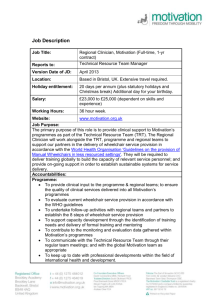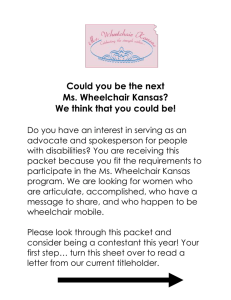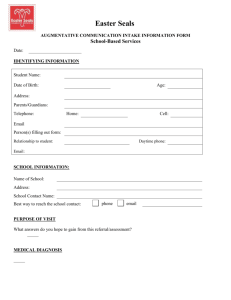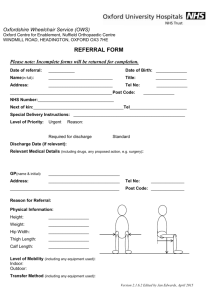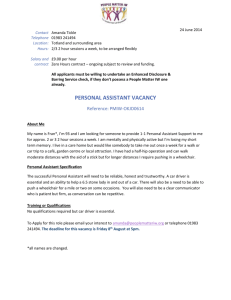museum sector access audit checklist
advertisement
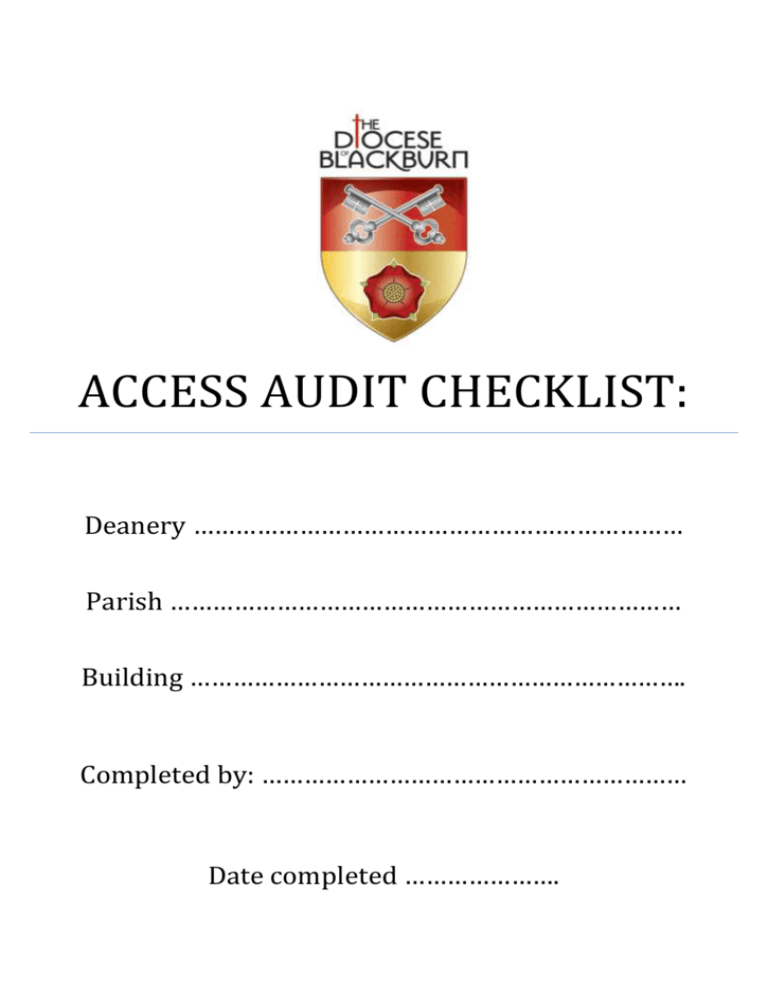
ACCESS AUDIT CHECKLIST: Deanery …………………………………………………………… Parish ……………………………………………………………… Building ……………………………………………………………. Completed by: …………………………………………………… Date completed …………………. Dear friends, This Access Audit checklist has been developed to help you consider some of the issues which face many in our communities today. All of you have buildings which can be regularly used by the public, and we hope that they are, buildings which can be a joy and also a source of frustration. If we are to use the buildings properly, and if what we do within them is to be of the highest standard then we need to ensure that they meet all of the requirements imposed on us by the Equality Act; just as we need to make sure that the services we offer are open to all. A church that excludes people because they are disabled is itself disabled. We would encourage you all to address this very simple checklist and then as a PCC devise an accessibility plan which you could implement to ensure that you are both welcoming and open to all. The checklist covers all aspects of buildings and services and separate one should be completed for each building you have. even though some of the questions are the same in the different sections but they relate to different parts of the building and the outside. Please send a copy of the completed audit to Canon Ed Saville, St Mary’s House, Cathedral Close, Blackburn BB1 5AA preferably by email to ed.saville@blackburn.anglican.org with the subject Access Audit and the Parish name. who can also be contacted for any advice. Diocese of Blackburn Access Audit July 2012 issue 1 Page 1 A - APPROACH and CAR PARKING Consider each question from the perspective of each type of disability: Wheelchair Visual Ambulant Auditory Dexterity Comprehension Tick the Y or N column as appropriate and add notes if necessary A mark in the ‘N’ column indicates that the element should be given consideration in an Accessibility Plan Y A1. A2. A3. A4. A5. A6. A7. A8. A9. A10. A11. A12. N Notes Is the building within convenient distance of a public highway? Is the building within convenient distance of public transport? Is the building within convenient distance of car parking? Is the route free of kerbs? a. If no, are there ‘drop kerbs’ conveniently placed? Is the surface smooth and slip resistant? Is the route wide enough for a wheelchair? Is it free of such hazards as bollards, litter bins, outward opening windows and doors or overhanging projections? Is it adequately lit? Is there car parking for people with reduced mobility? a. Is the car parking (if any) clearly marked out, signed, easily found and kept free from misuse? b. Is the car parking as near the entrance as possible? c. Is the car parking area suitably surfaced? Is the route to the building kept free of snow, ice and fallen leaves? Is the route level? (ie. no gradient steeper than 1:20 and no steps) Is there a suitable ramp to assist access? a. Is the ramp (if any) fixed? General notes to block: Diocese of Blackburn Access Audit July 2012 issue 1 Page 2 B – ROUTES AND EXTERNAL LEVEL CHANGE INCLUDING RAMPS AND STEPS Consider each question from the perspective of each type of disability: Wheelchair Visual Ambulant Auditory Dexterity Comprehension Tick the Y or N column as appropriate and add notes if necessary A mark in the ‘N’ column indicates that the element should be given consideration in an Accessibility Plan. Y B1. B2. B3. B4. B5. B6. B7. B8. N Notes Is there a ramp, with level surfaces at top/intermediate/bottom? (delete those not applicable) a. Is it wide enough and suitably graded? b. Is the surface slip resistant? c. Are the kerbs and edges protected to prevent accidents? d. Are there handrails to one or both sides? (delete those not applicable) If a permanent ramp (or re-graded levels) cannot be formed (perhaps to a Listed Building) is a portable ramp available? Are there (alternative) steps? a. Identified by visual/tactile information? b. Are there handrails to one or both sides? (delete those not applicable) Are ramps and steps adequately lit? Are treads and risers consistent in depth and height? Are all nosings marked and/or readily identifiable? (delete) Are landings of adequate size? a. Are they provided at intermediate levels in long flights? If safe and convenient ramps and steps cannot be provided is vertical movement by powered means an alternative? see checklist E, sheets 8 and 9 General notes to block: Diocese of Blackburn Access Audit July 2012 issue 1 Page 3 C – ENTRANCES, INCLUDING RECEPTION Consider each question from the perspective of each type of disability: Wheelchair Visual Ambulant Auditory Dexterity Comprehension Tick the Y or N column as appropriate and add notes if necessary A mark in the ‘N’ column indicates that the element should be given consideration in an Accessibility Plan. Y N Notes C1. C2. C3. Is the door clearly distinguishable from the facade? If glass is it visible when closed? Does the clear door opening or one leaf when opened permit passage of a wheelchair or double buggy? a. Does it have a level or flush threshold, and a recessed matwell? (delete those not applicable) b. Is there visibility through the door/way from both sides at standing and seated levels? c. Is there a minimum 300mm wide wheelchair manoeuvre space beside the leading edge of the door to clear doorswing? C4. Can the door furniture be used at both standing and seated height? a. Can it be easily grasped and operated? C5. If the door has a closer mechanism does it have a. delayed closure action? b. slow-action closer? c. minimal closure pressure? C6. If the door is power-operated does it have visual and tactile information? C7. If the door is security-protected is the system suitable for use by and within reach of people with sensory or mobility impairments? C8. If there is a lobby, do the inner and outer doors meet the same criteria? C9. Do lobby layouts enable all users to clear one door before going through the next? C10. Are signs designed and positioned to inform those with visual impairments and wheelchair users with reduced eye-levels? C11. Does the lighting installation take account of the needs of visually disabled people? C12. Are floor surfaces: a. slip-resistant, even when wet? b. of a quality that is sympathetic to acoustics – i.e. not so “hard” as to cause acoustic confusion? c. firm for wheelchair manoeuvre? Diocese of Blackburn Access Audit July 2012 issue 1 Page 4 C13. Are junctions between floor surfaces arranged in a way that avoids presenting tripping hazards and causing visual confusion? C14. Is any reception point suitable for approach and use from both sides by people in standing and seated positions? C15. Is it fitted with an induction loop? C16. If public telephone is available, is it, and its instructions: a. at a height suitable for all users? b. equipped with inductive coupling? C17. For those progressing to other parts of the building is information provided by signs, supported by tactile information? General notes to block: Diocese of Blackburn Access Audit July 2012 issue 1 Page 5 D – HORIZONTAL MOVEMENT AND ASSEMBLY Consider each question from the perspective of each type of disability: Wheelchair Visual Ambulant Auditory Dexterity Comprehension Tick the Y or N column as appropriate and add notes if necessary A mark in the ‘N’ column indicates that the element should be given consideration in an Accessibility Plan. Y N Notes D1. Is each corridor/passageway/aisle wide enough for a wheelchair user to manoeuvre and for other people to pass? D2. Is each corridor, etc, free from obstruction to wheelchair users and from hazards to people with impaired vision? D3. Do any lobbies allow users, (inc. w.ch. users) to clear one door before approaching the next with minimal manoeuvre? D4. Is turning space available for w.ch. users? D5. Do natural and artificial lighting avoid glare and silhouetting? D6. Do floor surfaces: a) allow ease of movement for wheelchair users? b) avoid light reflection and sound reverberation? D7. Do textured surfaces convey useful information for people with impaired vision? D8. Are direction or information signs (inc means of escape) a) visible from both sitting and standing eye levels, b) are they in upper and lower case, c) and large enough type to be read by those with impaired vision? D9. Are there tactile signs and information for those with impaired vision? D10. Is the maintenance of these items checked regularly? D11. Is lighting designed to meet a wide range of needs? D12. Is sufficient circulation space allowed for wheelchair users? D13. Is it maintained clear of obstructions which could create hazards for people with visual disabilities? D14. Are seating arrangements/spaces suitable for use by people with visual disabilities? D15. Are all areas for assembly/meeting equipped with an induction loop system? D16. If the use of an induction loop system is precluded is an infra-red system in place? D17. Is the functioning and operation of the induction loop or infra-red system checked regularly? D18. Are telephones fitted with inductive loop couplers? D19. Is a minicom available for use by people with hearing disabilities? Diocese of Blackburn Access Audit July 2012 issue 1 Page 6 General notes to block: Diocese of Blackburn Access Audit July 2012 issue 1 Page 7 E – VERTICAL MOVEMENT AND INTERNAL LEVEL CHANGE Consider each question from the perspective of each type of disability: Wheelchair Visual Ambulant Auditory Dexterity Comprehension Tick the Y or N column as appropriate and add notes if necessary A mark in the ‘N’ column indicates that the element should be given consideration in an Accessibility Plan. Y N Notes E1. Is the location of any step/stairs/ramp clearly indicated by use of sign/colour/contrast/texture/lighting? (delete those not applicable) E2. Does any step/stairs/ramp have a handrail to one/both side(s), a) and do(es) it/they extend 300mm beyond the top and bottom of any flight? (delete those not applicable) E3. Is any level change clearly lit? E4. Is the pitch (risers & treads) of step/stairs or any ramp consistent, and are nosings clearly identifiable? E5. If there are landings are they large enough to permit passing and turning manoeuvres, and are they provided in any long flight? E6. Is any short rise within a single storey ramped; if so is the ramped surface indicated, and is it slip-resistant? E7. Are all ramp gradients easily negotiated? [Range length 3m max = 1 in 12, 6m max = 1 in 26, 10m max = 1 in 20] E8. If a permanent ramp cannot be provided (perhaps a listed Building) can a moveable ramp be made available? E9. Are steps available as an alternative to any ramp or ramped surface? E10. Where level change is less than a full storey in height is a power-operated system appropriate? (Platform Lift/Stairlift/Lift see 11, 12 & 13)? (delete) E11. Platform Lift (delete) a) Are the controls at both levels identifiable, and reachable from sitting and standing levels? (delete) b) Is the platform adequate for wheelchair use and manoeuvre? c) In the event of a power failure does the platform return to lower level? d) Is the equipment maintained and its operation checked regularly? Diocese of Blackburn Access Audit July 2012 issue 1 Page 8 E12. Stairlift (delete) a) Are the controls at all levels identifiable, and reachable from sitting and standing levels? (delete) b) Is the platform adequate for wheelchair use and manoeuvre? c) Is approach convenient and safe at all appropriate landings? (delete) d) Does the stairlift have a ‘Soft-Start’ action? e) When not in use is the platform powered to fold away to avoid obstruction? f) In the event of a power failure does the platform return to lower level? g) Is the equipment maintained and its operation checked regularly? E13. Lift a) Is the lift's location clearly defined by visual and tactile information? (delete) b) Are controls at all floors visible, identifiable and reachable from sitting and standing levels? (delete) c) Is there adequate, unobstructed space at each floor lift entry for wheelchair manoeuvre? d) Does the lift door open widely enough for wheelchair user access? e) Does door operation allow slow entry and exit? f) Do the lift car internal dimensions allow sufficient space for a wheelchair user and carer? (delete) g) Does the car have appropriate support rails? h) Are the lift car controls. inc. emergency call, located within reach of all users and with visual and tactile information? i) Is there audible floor indication? j) Is the lift an 'Evacuation Lift? (see section J – MEANS OF ESCAPE) k) Is the lift regularly maintained and its functional operation routinely checked? General notes to block: Diocese of Blackburn Access Audit July 2012 issue 1 Page 9 F - DOORS Consider each question from the perspective of each type of disability: Wheelchair Visual Ambulant Auditory Dexterity Comprehension Tick the Y or N column as appropriate and add notes if necessary A mark in the ‘N’ column indicates that the element should be given consideration in an Accessibility Plan. Y N Notes F1. Do the doors serve a functional/safety purpose? (delete) F2. Can they be readily distinguished? F3. If glass, are they visible when shut? F4. Can people standing or sitting in a wheelchair see each other, and be seen from either side of the door? (delete) F5. Does the clear opening width permit wheelchair access? F6. On the opening side of the door is there sufficient space (300mm) to allow the door handle to be grasped and the door swung past a wheelchair footplate? F7. Is any door furniture/handle at a height for standing/sitting use? (delete) F8. Are door/handles clearly distinguished? F9. Can the door furniture/handles be easily operated/grasped? (delete) F10. If door closers/mechanisims are fitted do they provide the following: (delete) a) security linkage? b) delay-action closure? c) slow-action closure? d) minimum closure pressure? F11. Is door/mechanism function checked regularly? General notes to block: Diocese of Blackburn Access Audit July 2012 issue 1 Page 10 G - LAVATORIES Consider each question from the perspective of each type of disability: Wheelchair Visual Ambulant Auditory Dexterity Comprehension Tick the Y or N column as appropriate and add notes if necessary A mark in the ‘N’ column indicates that the element should be given consideration in anAccessibility Plan. Y N Notes G1. Is WC provision made for people with disabilities? G2. Do all lavatory areas have slip-resistant floors? G3. Are floors easy to distinguish by colour contrast from walls? G4. Are all fittings readily distinguishable from their background? G5. Are all door fittings/locks easily gripped and operated? G6. Can ambulant disabled people manoeuvre and raise and lower themselves in standard cubicles? G7. Is provision made for wheelchair users? If so: a) Is wheelchair approach free of steps/narrow doors/obstructions, etc? (delete) G8. Is the location clearly signed? G9. Is there sufficient space at entry to the compartment for wheelchair manoeuvre and door opening? G10. Are the door fittings/locks and light switches easily reached and operated? G11. Is there an emergency call system and is someone designated to respond? G12. Can the emergency call system be operated from floor level? G13. Is the wheelchair WC compartment large enough to permit manoeuvre for frontal lateral/angled/backward transfer, with or without assistance? (delete) G14. Are the fittings arranged to facilitate these manoeuvres? G15. Are handwashing and drying facilities within reach of someone seated on the WC? G16. Is the tap appropriate for use by someone with limited dexterity, grip or strength? G17. Are suitable grab rails fitted in all the appropriate positions to facilitate use of the WC? G18. Is the manoeuvring area free of obstruction, eg boxed-in pipework/radiators/cleaner's equipment/disposal bins/ occasional storage, etc., and is any difficulty caused by the activity of service contractors? G19. If there is more than one standard layout WC compartment provided, are they handed to offer a left-sided approach and a right-sided approach? Diocese of Blackburn Access Audit July 2012 issue 1 Page 11 G20. Are there baby changing facilities available in the toilet? a) If so, is it accessible from a wheelchair? General notes to block: Diocese of Blackburn Access Audit July 2012 issue 1 Page 12 H – FIXTURES AND FITTINGS Consider each question from the perspective of each type of disability: Wheelchair Visual Ambulant Auditory Dexterity Comprehension Tick the Y or N column as appropriate and add notes if necessary A mark in the ‘N’ column indicates that the element should be given consideration in an Accessibility Plan. Y N Notes H1. H1. Is any servery/counter accessible to all users, including those with hearing impairments? H2. If the building has fixed seating are there also associated spaces for wheelchair users and at regular intervals on long routes? H3. Is there an accessible space for people to read, or pray from, in a prominent position (near the lectern)? H4. Is it possible for wheelchair users and people with other disabilities to approach and use all vending machines/drinking water dispensers, etc? H5. Is it possible for people with disabilities to serve as volunteers? H6. Are all fittings readily distinguishable from their background? H7. Where there are display stands, bookstalls etc. are they visible/reachable/accessible by people with disabilities? H8. In any eating/meeting space do tables, chairs and the layout allow for use by wheelchair users and other people with disabilities? H9. In any staff accommodation is it suitable for use by people with disabilities including wheelchair users, with slip-resistant floor, reduced level kitchen units and sink and lever action taps? H10. Are all relevant locations clearly signed? General notes to block: Diocese of Blackburn Access Audit July 2012 issue 1 Page 13 I - COMMUNICATION Consider each question from the perspective of each type of disability: Wheelchair Visual Ambulant Auditory column Dexterity add Comprehension Tick the Y or N as appropriate and notes if necessary A mark in the ‘N’ column indicates that the element should be given consideration in an Accessibility Plan. Y N Notes I1. I2. I3. I4. Is the building equipped to provide hearing assistance? Is it clearly signed as such? Does it include all areas of the building? Does lighting installation of the building take into account the needs of people with visual disabilities? I5. Does any sound system in the building provide good, clear sound with adequate voice levels? a. Are there sufficient microphones for all leaders in worship? b. Are they fixed or can they be used flexibly? I6. Are there large-print versions of information, services and hymn book available? I7. Can the face of speakers be seen clearly from within the building? I8. Is there 'braille' information available for people with visual disabilities? I9. Is anyone available to provide signed interpretation? a. If so do they cover all activities? b. If not do you know where the nearest church which offers the facility , or how to contact a signing interpreter? I10. Is there an 'audio' version of information about the building available? I11. If a data / overhead projector is used can it be viewed easily from all places? I12. Is there a copy of screen based information for those who cannot raise their head? I13. Where there are staff available in the building at information/refreshment facilities, are they trained in communication with people with physical and sensory disabilities? I14. Where a payphone is provided does it have a hearing aid coupler? I15. Are all relevant locations clearly signed? Diocese of Blackburn Access Audit July 2012 issue 1 Page 14 General notes to block: Diocese of Blackburn Access Audit July 2012 issue 1 Page 15 J – MEANS OF ESCAPE Consider each question from the perspective of each type of disability: Wheelchair Visual Ambulant Auditory Dexterity Comprehension Tick the Y or N column as appropriate and add notes if necessary A mark in the ‘N’ column indicates that the element should be given consideration in an Accessibility Plan. Y J1. J2. J3. J4. J5. J6. J7. J8. J9. J10. N Notes Is there a visible as well as audible fire alarm system? Are final exit routes as accessible to all, including wheelchair users, as are the entry routes? Is evacuation from upper and lower levels possible using an evacuation lift/platform lift with a protected power supply? If people with disabilities cannot evacuate from the building independently are designated and signed refuges available? If refuges are available are they equipped with 'carry chairs'? Is there a 'management evacuation strategy' for all people? Is someone on duty responsible for the evacuation procedure? Is the evacuation strategy checked regularly for its effectiveness? Are evacuation routes checked routinely and regularly for freedom from combustible materials/obstacles/locked doors? Are all fire warning devices and detectors checked routinely and regularly? General notes to block: Diocese of Blackburn Access Audit July 2012 issue 1 Page 16
